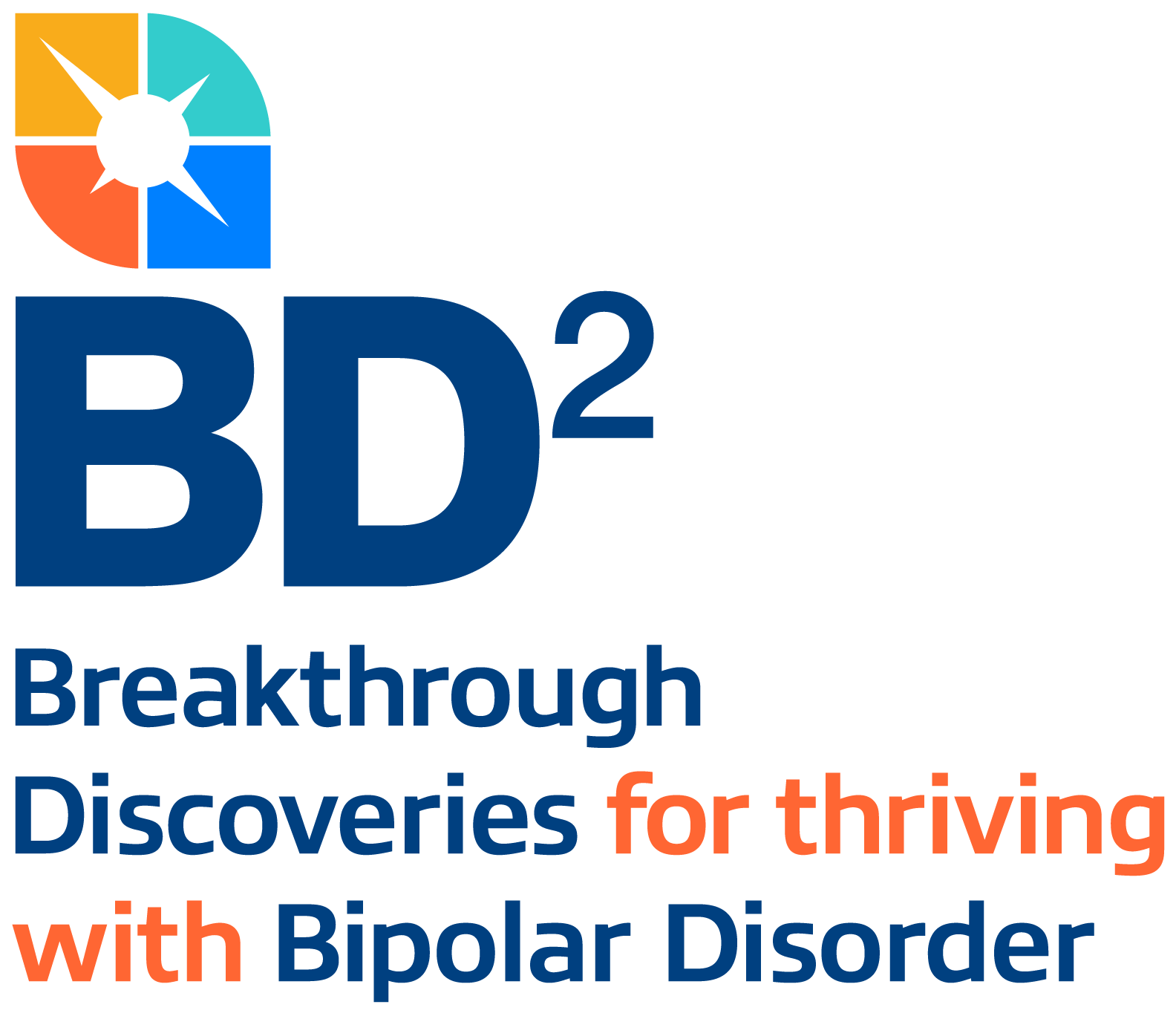About BD2
Breakthrough Discoveries for thriving with Bipolar Disorder, or BD², is a collective force transforming what we know about and how we treat bipolar disorder. It’s a commitment to the 40 million people living with bipolar disorder, those not yet diagnosed, and their loved ones. Our vision is that breakthroughs in scientific understanding will create new interventions so that everyone living with bipolar disorder will thrive.
The Opportunity
Throughout the decades of bipolar disorder research, it has become clear that research strategies must shift drastically to ensure faster and more significant discoveries. Philanthropic support has presented a once-in-a-generation opportunity to develop a unique mechanism to bring the most capable and innovative minds together to explore one of the most complex mental disorders.
Teams of three to five scientists may apply to receive up to $1.5 million per year for three years, totaling $4.5 million per award. Teams must submit a 2-page letter of intent (LOI) outlining the causal mechanistic hypothesis, goals, general aims, scientific strategies, and methodologies they will employ. This LOI must have a scientific scope that is impactful and will significantly contribute to our understanding of the causal mechanisms of bipolar disorder.
Selected teams will then be invited to develop a 5-page application that describes the scientific scope, technical strategies, team capabilities, a comprehensive budget, organizational commitments, and other details. Funded teams will be expected to share resources, data, and progress with other teams in the network throughout the funding period. Teams will also have the opportunity to develop new partnerships with other teams within the network and the potential to access additional collaborative grants. We intend to continue funding an additional two years beyond the original three-year grant period for teams exhibiting strong productivity and promise.
A Focus on Mechanisms of BD
We seek multidisciplinary teams of researchers from across the world to pool ideas and work together across expertise to explore the fundamental mechanisms of bipolar disorder. Successful teams will present a diversity of techniques, methodologies, and expertise that focus on a central causal mechanistic hypothesis that gives rise to the etiology of bipolar disorder. Applications that utilize multiple techniques, such as animal models, biochemical techniques, cell models that include human iPSCs and brain organoids, and brain imaging, will be considered. Additionally, applications that seek to collect data or samples from existing patient cohorts will be accepted. A gender and racial diversity of subjects and samples reflective of the general population will strengthen an application. Applications focused on the clinical efficacy of a treatment or intervention, especially recruitment of participants into new or existing trials or administrative or infrastructure support for clinical trials, are not within the scope of this program and should not be submitted for consideration.
Funded teams should champion team science, open science, and innovative thinking. We encourage applications from teams that are diverse in perspective, expertise, gender, institution, and career stage. We seek to build a vibrant community of funded investigators who will use ambitious strategies to test causal mechanisms and hypotheses to better understand the etiology, temporal dynamics, and heterogeneity of bipolar disorder.
Important Dates
September 19, 2023: RFA released
November 14, 2023 at 11:59 PM PT: Letters of Intent (LOIs) due
December 12, 2023: Invitation for full proposals sent
February 20, 2024 at 11:59 PM PT: Full proposals due
March to June 2024: Scientific and strategic evaluation
July 2024: Awardees notified
August 2024: Grants awarded
Read our open science policy here
Download the RFA here
BD2 Discovery Research Grants - Request for Applications
About BD2
Breakthrough Discoveries for thriving with Bipolar Disorder, or BD², is a collective force transforming what we know about and how we treat bipolar disorder. It’s a commitment to the 40 million people living with bipolar disorder, those not yet diagnosed, and their loved ones. Our vision is that breakthroughs in scientific understanding will create new interventions so that everyone living with bipolar disorder will thrive.
The Opportunity
Throughout the decades of bipolar disorder research, it has become clear that research strategies must shift drastically to ensure faster and more significant discoveries. Philanthropic support has presented a once-in-a-generation opportunity to develop a unique mechanism to bring the most capable and innovative minds together to explore one of the most complex mental disorders.
Teams of three to five scientists may apply to receive up to $1.5 million per year for three years, totaling $4.5 million per award. Teams must submit a 2-page letter of intent (LOI) outlining the causal mechanistic hypothesis, goals, general aims, scientific strategies, and methodologies they will employ. This LOI must have a scientific scope that is impactful and will significantly contribute to our understanding of the causal mechanisms of bipolar disorder.
Selected teams will then be invited to develop a 5-page application that describes the scientific scope, technical strategies, team capabilities, a comprehensive budget, organizational commitments, and other details. Funded teams will be expected to share resources, data, and progress with other teams in the network throughout the funding period. Teams will also have the opportunity to develop new partnerships with other teams within the network and the potential to access additional collaborative grants. We intend to continue funding an additional two years beyond the original three-year grant period for teams exhibiting strong productivity and promise.
A Focus on Mechanisms of BD
We seek multidisciplinary teams of researchers from across the world to pool ideas and work together across expertise to explore the fundamental mechanisms of bipolar disorder. Successful teams will present a diversity of techniques, methodologies, and expertise that focus on a central causal mechanistic hypothesis that gives rise to the etiology of bipolar disorder. Applications that utilize multiple techniques, such as animal models, biochemical techniques, cell models that include human iPSCs and brain organoids, and brain imaging, will be considered. Additionally, applications that seek to collect data or samples from existing patient cohorts will be accepted. A gender and racial diversity of subjects and samples reflective of the general population will strengthen an application. Applications focused on the clinical efficacy of a treatment or intervention, especially recruitment of participants into new or existing trials or administrative or infrastructure support for clinical trials, are not within the scope of this program and should not be submitted for consideration.
Funded teams should champion team science, open science, and innovative thinking. We encourage applications from teams that are diverse in perspective, expertise, gender, institution, and career stage. We seek to build a vibrant community of funded investigators who will use ambitious strategies to test causal mechanisms and hypotheses to better understand the etiology, temporal dynamics, and heterogeneity of bipolar disorder.
Important Dates
September 19, 2023: RFA released
November 14, 2023 at 11:59 PM PT: Letters of Intent (LOIs) due
December 12, 2023: Invitation for full proposals sent
February 20, 2024 at 11:59 PM PT: Full proposals due
March to June 2024: Scientific and strategic evaluation
July 2024: Awardees notified
August 2024: Grants awarded

